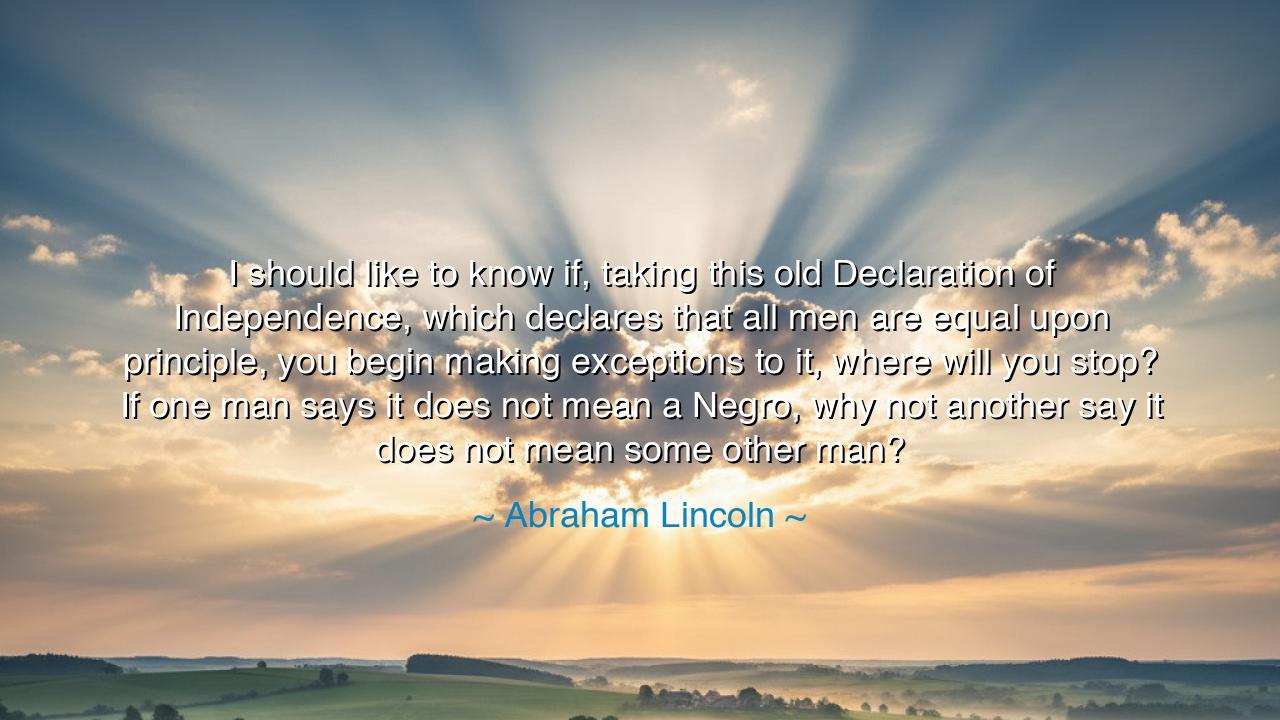
I should like to know if, taking this old Declaration of
I should like to know if, taking this old Declaration of Independence, which declares that all men are equal upon principle, you begin making exceptions to it, where will you stop? If one man says it does not mean a Negro, why not another say it does not mean some other man?






There are words that echo across centuries, as if carried by the breath of conscience itself — and among them are those of Abraham Lincoln, who declared, “I should like to know if, taking this old Declaration of Independence, which declares that all men are equal upon principle, you begin making exceptions to it, where will you stop? If one man says it does not mean a Negro, why not another say it does not mean some other man?” In these words burns the eternal fire of justice — the warning that the moment one life is deemed less than another, the foundation of equality begins to crumble. Lincoln’s voice was not only the voice of a president; it was the voice of civilization pleading with itself to remain human.
The Declaration of Independence, that sacred promise written in 1776, declared that “all men are created equal.” But by Lincoln’s time, America was torn in two — one half clinging to the ideal, the other twisting it to excuse slavery. Many sought to narrow the meaning of those immortal words, to say they applied only to certain races or classes. But Lincoln, standing like a prophet before a trembling nation, saw the danger of this heresy. “Where will you stop?” he asked — for he knew that injustice, once tolerated, spreads like rot, consuming even the hands that harbor it. If equality is conditional, then liberty is illusion.
His warning was not about a single group alone; it was about the fragility of principle itself. Once a people begin to carve exceptions into their moral law, they set no limit to how small the circle of humanity may shrink. Today it may exclude the slave; tomorrow, the immigrant, the poor, the dissenter, the weak. This was the wisdom Lincoln carried from the fields of Kentucky to the White House — that freedom must be universal, or it will not endure. He saw that equality is not a gift bestowed by the powerful, but a truth bestowed by the Creator, written not in law but in the human soul.
Consider the story of the Roman Republic, which once prided itself on justice and virtue. Yet as it grew rich and powerful, it began to make exceptions — one class of men for citizens, another for slaves; rights for the Senate, none for the provinces. Each exception justified the next, until corruption consumed the republic and liberty died in the shadow of empire. The Romans forgot what Lincoln remembered: that equality is the shield of freedom, and when that shield is pierced, even the mighty are left defenseless.
Lincoln’s words were born not only from reason but from moral vision. He understood that the struggle against slavery was more than a political debate — it was a test of whether mankind believed its own creed. The “old Declaration” was not merely parchment; it was the covenant of the nation’s soul. To betray it was to betray the sacred promise that all men, by virtue of their humanity, possess an equal claim to dignity. And so Lincoln’s defense of the enslaved was also a defense of America’s identity — for a nation cannot live in contradiction without tearing itself apart.
His question, “Where will you stop?” remains a mirror held to every age. Each generation faces its own temptation to draw lines between who is “worthy” and who is not — lines of color, creed, class, or belief. And each time, history answers: once you begin to divide humanity, you will not stop until you destroy it. Lincoln’s wisdom reaches beyond his century to ours, reminding us that equality is not merely a political right, but a spiritual discipline — the practice of seeing ourselves in others.
Therefore, my child, take this lesson as sacred truth: do not make exceptions to the principle of equality, not in word, not in thought, not in heart. For the moment you say “this one is lesser,” you open the gate to your own undoing. Stand, as Lincoln stood, upon the rock of moral courage. Defend the dignity of every person, not because it is convenient, but because it is right. And remember always that the Declaration of Independence is not only a relic of the past — it is a living command to the future, a torch that will burn only so long as we keep it lit with justice.






AAdministratorAdministrator
Welcome, honored guests. Please leave a comment, we will respond soon